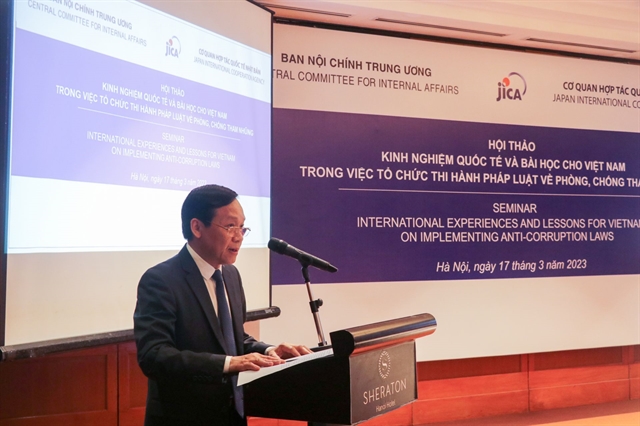 Society
Society


|
| Nguyễn Thanh Hải, Deputy Head of the Central Committee for Internal Affairs (CCIA) speaks at the seminar. VNA/VNS Photo |
HÀ NỘI Vietnamese and international law experts shared experience in fighting corruption in Việt Nam at a seminar on Friday in Hà Nội.
Speaking at the seminar themed "International experiences and lessons for Việt Nam on implementing anti-corruption laws", Nguyễn Thanh Hải, Deputy Head of the Central Committee for Internal Affairs (CCIA), said the Party and State of Việt Nam have made significant progress in anti-corruption efforts in recent years.
Hải highlighted the comprehensive and positive effects of the country's anti-corruption work, which has gained both national and international recognition.
However, Hải also acknowledged that the country's legal system and law enforcement efforts still have limitations and require improvement.
Nguyễn Công Hồng, former Vice Chairman of the Judiciary Committee of the National Assembly, emphasised the importance of learning from other countries to effectively fight corruption.
In Asia, countries like the Republic of Korea, Japan, and China have a lot of experience in anti-corruption, from building institutions, and a team of professional and ethical civil servants to raising public awareness and creating mechanisms to encourage detection and handling of corruption, he said.
Singapore's experience shows the leadership must take action to fight corruption, and punish anyone with corrupt behaviours, he said.
Anti-corruption measures must be frequently reviewed for changes and avoiding loopholes. Anti-corruption agencies must be transparent. There is no need to have too many employees. Any corrupt inspectors, if committing violations, must be punished, he said.
Japan has a number of legal regimes on corruption such as the Law on Control of Political Funds, the Law on disclosing assets of National Assembly members in order to build political ethics, he said.
Nguyễn Hưng Quang, head of Law Office NhQuang&Associates, Chairman of the Vietnam International Commercial Mediation Centre, said Australia has a history of fighting corruption. Australia’s anti-corruption campaign has been conducted in a logical manner with anti-corruption education programmes in the community, schools and in every field of social life.
Australia has applied many measures, including legal reform, strict regulations on the selection, appointment and promotion of judges, ensuring the income of judges, strengthening the supervision and discipline on judges, as well as enhancing public trust on the judges, he said. VNS




